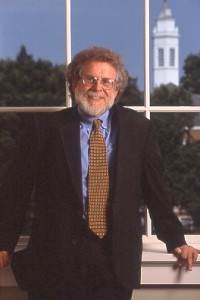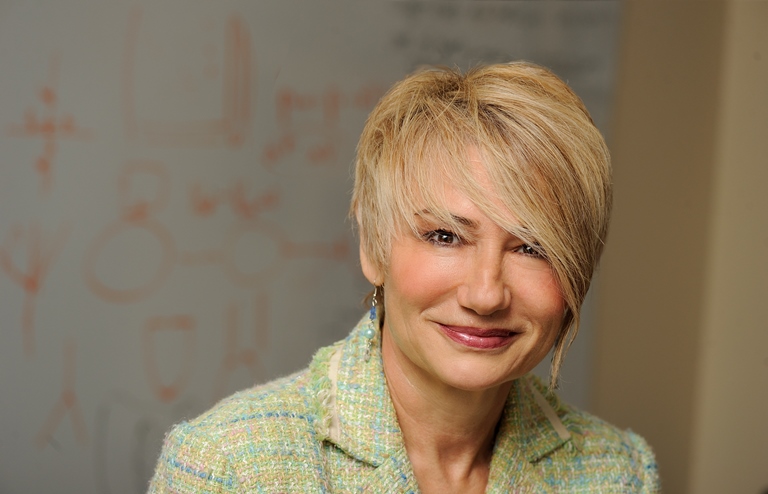 MURRAY B. SACHS served as the Massey Professor and Director of the Department of Biomedical Engineering from 1991 to 2007. He is also professor in the departments of Neuroscience and Otolaryngology-Head and Neck Surgery and a University Distinguished Service Professor at Johns Hopkins.
MURRAY B. SACHS served as the Massey Professor and Director of the Department of Biomedical Engineering from 1991 to 2007. He is also professor in the departments of Neuroscience and Otolaryngology-Head and Neck Surgery and a University Distinguished Service Professor at Johns Hopkins.
Dr. Sachs was introduced to research on the nervous system while studying electrical engineering and auditory physiology at the Massachusetts Institute of Technology, where he received his academic degrees. Following his graduate studies and a short diversion from the auditory research for which he is renowned, he joined the faculty of The Johns Hopkins University in 1970, the same year the Biomedical Engineering Department was formed.
At Johns Hopkins, Dr. Sachs and his colleagues set out to further understand how the brain processes sounds, including speech and other complex stimuli. Their integration of basic research and clinical problems led to the establishment of the Center for Hearing Sciences in 1986, which later became the Center for Hearing and Balance in 1991. Under Dr. Sachs’ direction, this center promoted interaction among scientists in the departments of Biomedical Engineering, Otolaryngology, and Neuroscience. Known as an inspiring teacher, Dr. Sachs trained many scientists who are leaders in auditory research and biomedical engineering today.
During Dr. Sachs’ tenure as director and chair of Biomedical Engineering, the department saw many important advances, including the establishment of the Whitaker Biomedical Institute in 1999, a joint venture between the School of Medicine and the Whiting School of Engineering; the building of Clark Hall in 2001 as a home for biomedical engineering on the Homewood campus; and the department’s U.S. News & World Report number one ranking from 1992 to the present.
Held by Natalia Trayanova

NATALIA TRAYANOVA, the inaugural Murray B. Sachs Professor, received her doctorate in biophysics/bioengineering from the Bulgarian Academy of Sciences and completed her postdoctoral training at Duke University.
Before joining the faculty at Johns Hopkins in 2006, Dr. Trayanova was a professor of biomedical engineering at Tulane University, where she started the Computational Cardiac Electrophysiology Laboratory.
Dr. Trayanova’s research centers around understanding the normal and pathological electrophysiological and electromechanical behavior of the heart, with emphasis on the mechanisms for cardiac arrhythmogenesis, cardiac electromechanical interactions, and the improvement of the clinical therapies of defibrillation, infarct-related ventricular ablation, and cardiac resynchronization therapy using a personalized approach.
Dr. Trayanova is the author of over 230 journal publications and book chapters in prestigious journals, and of over 150 abstracts. She is the editor of “Cardiac Defibrillation-Mechanisms, Challenges and Implications,” InTech Publishing, 2011. Dr. Trayanova is the recipient of numerous awards including the Excellence in Research and Scholarship Award and Outstanding Researcher Award from Tulane University and the Fulbright Distinguished Research Award. At Johns Hopkins, she was named the William R. Brody Faculty Scholar in 2009.
Dr. Trayanova is associate editor of Frontiers in Computational Physiology and Medicine, served as an associate editor of IEEE Transactions of Biomedical Engineering from 1997-2005, is on the editorial board of the journals Heart Rhythm and American Journal of Physiology (Heart and Circulatory System), and is an area editor of IEEE Reviews in Biomedical Engineering. Dr. Trayanova has served as a member of the NIH ESTA and MABS Study Sections. She is a fellow of the Heart Rhythm Society, American Heart Association, and the American Institute for Medical and Biological Engineering.
 MURRAY B. SACHS served as the Massey Professor and Director of the Department of Biomedical Engineering from 1991 to 2007. He is also professor in the departments of Neuroscience and Otolaryngology-Head and Neck Surgery and a University Distinguished Service Professor at Johns Hopkins.
MURRAY B. SACHS served as the Massey Professor and Director of the Department of Biomedical Engineering from 1991 to 2007. He is also professor in the departments of Neuroscience and Otolaryngology-Head and Neck Surgery and a University Distinguished Service Professor at Johns Hopkins.